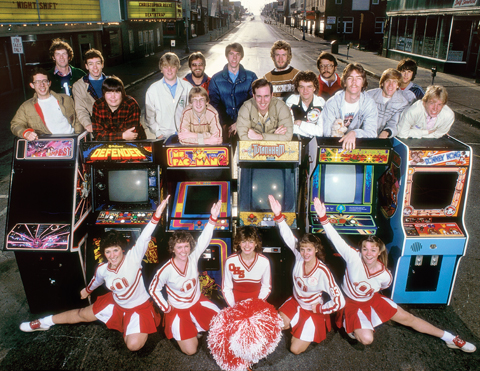Q
& A : Chasing Ghosts
By Jeff Hanson
Anyone
who ever put a quarter into a Pac-Man or Space Invaders
game in the early ‘80s will appreciate being yanked
into the nostalgic charm of Chasing Ghosts. The
documentary centers on the pioneer players of the
then-fledgling video game industry, and the arcade
classics that served as precursors to today’s
billion dollar gaming mega-empire. On hand for the
Q&A after a recent screening were director Lincoln
Ruchti, producer Michael Verrechia, director of
photography Lisa Wiegand, official gaming scorekeeper
Walter Day, and world champion gamers Ben Gold and Mark
Robichek, who were featured in the film.

Director
Lincoln
Ruchti, Chasing Ghosts.
--
Photo By Joy Reyneke, Wireimage.com |
"Mike
[Verrechia] sent me an article on Bill Mitchell
and his perfect Pac-Man game and his Donkey Kong
score. He was immediately compelling –
partly because of the mullet, but also because of
his attitude... "
|
Q:
Tell us about the evolution of the film. How did it all
come together?
Ruchti: Mike [Verrechia] sent me an article on
Bill Mitchell and his perfect Pac-Man game and his Donkey
Kong score. He was immediately compelling – partly
because of the mullet, but also because of his attitude
– and so I thought he’d be a good subject. We
did some research and found that Life Magazine
photo, and I think as soon as we saw it we knew we wanted
to do the movie. We contacted Walter [Day], who put it
all together, and he was very open to doing the story. He
helped us find some of the people.
Day: This really is only the beginning
of examining the history of video game playing. Because
video games are becoming so big, so monstrous, so
widespread, with so much money involved. The future is
going to be looking back on these moments a thousand
times more than what this movie has looked on. All the
people who were connected to Twin Galaxies (Walter’s
arcade) were true pioneers. They were the first video
game fanatics. They were the first video game stars. Now
there are millions of them. But in those days, there were
only a few dozen who were hardcore enough to get on a bus
and come to Twin Galaxies, the birthplace of organized
video game playing. And these guys were that story.
Q:
(To the gamers) How do you feel about players like Thresh
and Fatality [current professional gamers] who have
created very lucrative careers?
Gold: I was 16 when all of this was happening,
and that was my dream, to become a professional video
game player. Today, the players have gone far beyond what
we ever did. We couldn’t imagine the Internet and
the online phenomenon. All we had then was the telephone
and airplane tickets. That was the way we communicated.
There were probably people out there who didn’t know
about the scoreboard or found out about it later. Today
the kids are professionals. There’s more money and
the games are really complicated. I hate to say this, but
it’s a lot easier to stick in a quarter and play one
of those older games because these new ones are just a
little bit beyond me.
Day: I want to stick up for Ben and
everybody else in the early ‘80s because that skill
set they had back then is the same skill set that Thresh
and Fatality are using today. However, these guys were
born a generation and a half too early and didn’t
have the opportunity that’s now available through
modern technology through the Internet and especially
through modern funding and sponsorships. That’s why
it really didn’t take off because there was no money
to fuel the development of leagues and teams. They were
the stars back then and they would have been the stars
today, but they were born too early. It’s as simple
as that.
Q:
It’s a beautiful looking documentary – can you
talk about what you shot it in and how you made it look
so good?
Wiegand: We shot the modern day footage on HD on
a Sony F900 and I think if we had the option to use a
smaller HD camera we might have done it. We had to lug a
lot of stuff around to a lot of different places.
Robichek: I had not seen the movie
before today, not even a piece of it. So it was very
interesting to see how we video-gamers from 20 some odd
years ago were portrayed. And I was very glad to see that
maybe I didn’t come across as normal but I was more
normal than the others.
Q:
What percentage of your budget went into the music? You
had really great music.
Ruchti: It was probably way too much.
That’s the biggest part, finding all those old
pieces of footage and finding the music that fits and
then finding out who owns them. We started collecting
early, but most of the footage came from personal
collections. It was kind of nice to see that they care
enough about that time period that they keep it all
themselves.
|

